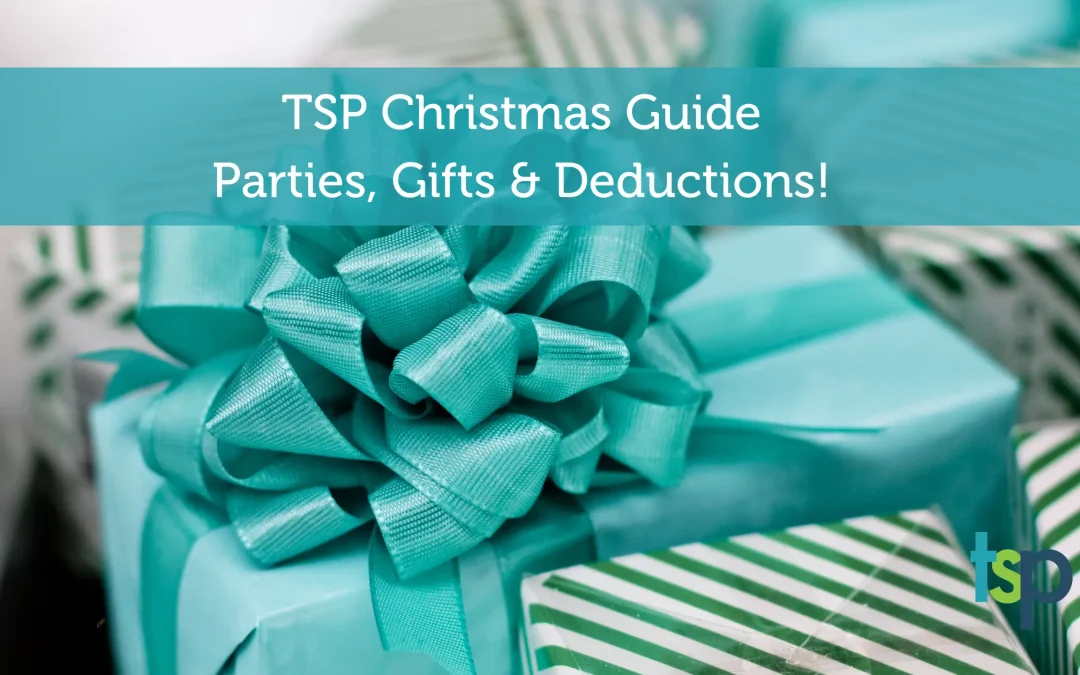Guide to Christmas Tax Deductions for Parties, Staff and Client Gifts
By Deidre Molloy, Director, TSP Accountants & Business Advisors. Connect with Deidre on Linkedin
With Christmas just around the corner, I know many of us are excited to show appreciation to our clients and teams. From festive Christmas parties to thoughtful gifts, these gestures go a long way in strengthening our business relationships and boosting team morale.
But as much as I love spreading holiday cheer, I also believe in doing so wisely. If there’s an opportunity to make some of these expenses tax deductible, it’s worth understanding the rules so that we can save where we can and keep our holiday budgets under control. In this blog, I want to share a comprehensive guide on which Christmas expenses—like parties, staff gifts, and client gifts—are claimable, and which ones aren’t.
Christmas Parties: What You Can (and Can’t) Claim as a Tax Deduction
Throwing a Christmas party for the team is a fantastic way to bring everyone together. However, from a tax perspective, not all party expenses are treated equally. Here’s what you need to know:
Deductible Party Expenses
One of the best ways to ensure that employee-related party expenses remain deductible is by using the minor benefits exemption. This exemption allows you to spend up to $300 per employee without attracting Fringe Benefits Tax (FBT). If you stay under this threshold, those party expenses will not only be deductible, but you’ll also avoid any FBT—making it a win-win for your business!
When it comes to parties, certain costs associated with employees may be deductible. For example, if you’re renting a venue, providing food and nonalcoholic beverages, these can often be tax deductible as long as the party is intended for employees.
Non Deductible Party Expenses
Now, let’s look at the non deductible side. Expenses that qualify as “entertainment”—such as alcohol, live music, or hiring a DJ—usually don’t fall under deductible expenses. If the gathering is primarily for clients rather than employees, keep in mind that ATO guidelines consider this as entertainment, which also makes it non deductible.
Staff Gifts: Maximising Deductions with Non Entertainment Gifts
Gifting hardworking staff is one of the highlights of the season, but let’s ensure we keep it tax deductible by choosing the right types of gifts.
Claimable Staff Gifts
To keep your staff gifts claimable, it’s best to stick to non entertainment items. Think of gifts like vouchers, food hampers, chocolates or wine. As long as the gift falls under the $300 minor benefits exemption per person, you’ll be able to claim it as a tax deduction and keep it FBT free. This means you can give meaningful gifts while being tax smart about it.
Non Claimable Staff Gifts
On the other hand, any gifts that could be considered “entertainment” are generally non claimable. This includes concert tickets, sporting event passes, or holiday experiences. If you’re planning to keep gifts tax deductible, it’s better to avoid anything in the entertainment category.
Recording Staff Gifts for Deductions
Don’t forget to document everything! Record the value and type of gift, along with the name of the employee receiving it. Keeping clear records ensures compliance with ATO guidelines, makes FBT calculations easier, and keeps your deductions in order.
Client Gifts: Choosing Deductible, NonEntertainment Options
For clients, a thoughtful Christmas gift is a great way to show your appreciation and strengthen relationships. From a tax standpoint, however, only certain types of client gifts are deductible.
Tax Deductible Client Gifts
To ensure client gifts remain tax deductible, it’s best to choose non entertainment items. Examples include branded merchandise, gourmet hampers, diaries or stationery, and wine. These items are viewed as “non entertainment” and generally qualify as a business expense deduction.
Non Deductible Client Gifts
Similar to staff gifts, any client gift that falls under the entertainment category will be non deductible. This includes event tickets, dinners, or any kind of holiday package. So, while a gift card to a popular store or a nice set of branded stationery would be deductible, a dinner voucher wouldn’t be.
Keeping Client Gift Expenses Tax Smart
Try to stay within reasonable gift limits for clients to avoid raising any red flags with the ATO. Also, as always, save receipts and record your gift expenses to ensure accurate deductions.
Record Keeping Tips for Christmas Deductions
When it comes to deductions, good record keeping is essential. To make your Christmas spending tax efficient and avoid any compliance issues, I recommend these simple steps:
1. Save All Receipts: Whether it’s for the party venue, gifts, or catering, keep a record of every transaction. It’s also a good idea to have receipts easily accessible for the next tax season.
2. Label Employee and Client Expenses: Clearly label expenses related to employees and those related to clients. By categorising holiday spending separately, you can ensure each deduction is claimed correctly.
3. Documentation for FBT Compliance: Keep a detailed list of any expenses that might fall under the FBT category, along with their values. This will help you stay organised and avoid any surprise FBT charges.
Making the Most of Christmas Tax Deductions
The holidays are a time for giving, but it’s also a time when we can be tax savvy. By choosing deductible, non entertainment gifts for clients and employees, keeping Christmas party expenses under the minor benefits exemption, and maintaining proper records, you can make your holiday spending work harder for your business. These deductions not only help make holiday celebrations more affordable but also ensure you stay compliant with ATO rules.
If you have any questions or require further assistance with your Christmas party or gift spending, please reach out to the TSP team!
- Why Your Business Needs a Newcastle Accountant. - 27/02/2025
- Should Credit Card Surcharges Be Banned? - 12/02/2025
- Cash Flow – 5 Proven Strategies To Keep It Positive - 16/01/2025

